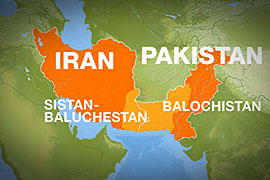In depth: Sistan-Baluchestan
Ethnic Baluchs in Iran’s southeast maintain a tense relationship with Tehran.

 |
| Zahedan, the provincial capital, has been the scene of several past attacks [EPA] |
Iran’s Baluch minority numbers between one and four million people, based mainly in the southeastern region of Sistan-Baluchestan.
The region is poor and underdeveloped. Made up of rugged, mountainous terrain, it has become a haven for heroin and opium-smuggling from across the border with neighbouring Pakistan and Afghanistan.
The Baluchs who live there are mostly Sunni Muslims, while the majority of Iran’s population are Shia, and identify themselves as part of an ancient tradition separate from that of Iran’s Persian ethnicity.
Instead, they identify closely with the Baluch populations across the border, but rather than considering themselves part of those countries, the Baluchs have in general been fiercely independent.
Those in the Pakistani province of Balochestan have been engaged in a long-running conflict with Islamabad and many Baluchs see their dream of a “Greater Baluchestan” as having been thwarted by colonial and regional powers.
Islamabad claims that Iran has supported the Baluch insurgency in Pakistan.
Lawless region
Majid Tafreshi, a specialist in ethnic and religious minorities at University College London, said it was important not to characterise all Baluchs as taking up arms against Tehran in the name of independence.
“Balouchi Iranians want prosperity and freedom inside their territory and they want local authorities selected from their own people,” he said in an interview with Al Jazeera.
“That’s one of the main demands and it’s never happened totally before or after the revolution [of 1979] because the government didn’t trust them.”
 |
Iran’s Baluch population complains of discrimination and sectarian clashes have occurred sporadically.
A series of bombings were reported in the region in October 2000 and in Zahedan, the provincial capital, in June 2005.
Analysts say the drugs trade and kidnappings for ransom in Sistan-Baluchestan are a major worry for Tehran, which often seeks to blame the criminal activity on organisations such as the Baluchistan United Front.
The Baluch organisations deny these allegations. Instead, there have been suggestions that elements in Iran’s Revolutionary Guards has links to the drugs trade.
Baluch organisations also claim the Revolutionary Guards have been involved in atrocities against ethnic Baluchs in the region.
Sunni fighters
Jundollah, a little known armed Baluch organisation operating in Sistan-Baluchestan, has claimed responsibility for several attacks on Revolutionary Guards.
The group is led by Abdul Malik Rigi, an ethnic Baluch.
In 2005, Jundollah claimed to be behind the abduction of several security and intelligence officials.
It has also claimed responsibility for the bombing of a Shia mosque in Zahedan in May and a suicide bombing on October 18, in which about 30 people were killed, including at least seven Revolutionary Guards commanders.
The Iranian authorities have been keen to connect Jundollah, which is thought to have emerged in 2003, to al-Qaeda and the Taliban, though there is only limited evidence to support this.
Jundollah has said in the past that it uses violence only to defend Baluch and Sunni Muslim interests in Iran.
Tehran says that armed groups operating in Sistan-Baluchestan, including Jundollah, are backed by Saudi Arabia and supported by the US and Britain.